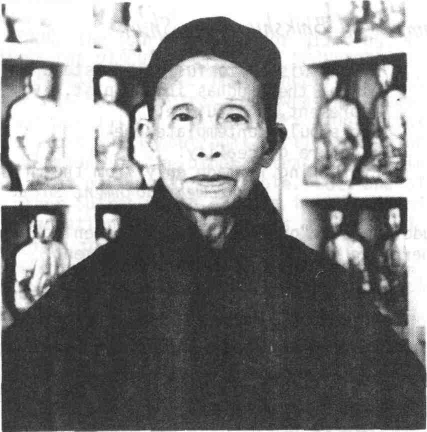The Bodhi Mirror Presents

BHIKSHUNI KUO LI SHIH
Kuo Li Shih received full ordination at Pau Lien Ch'an Monastery in Hong Kong on September 13th, 1960. Originally before she encountered the Buddhadharma she believed in another religion but even so, she liked to bow. Eventually she heard someone describe a Buddhist Master who was endowed with Way-virtue and great compassion. So she accompanied her friend to meet the Venerable Master Hua and wanted to take refuge as soon as she'd seen him. Not only that, she didn't want to work at her job any more, so she simply resigned and moved to Tse Hsing Sse, the Master's large isolated monastery on Lanto Island. Her Dharma name became "Fruit of Bowing" and she continued to bow after she met the Buddhadharma with ever deepening sincerity. Since the monastery was large, by the time she had helped care of it and then helped in the fields around it, the day was gone. So she would bow in the evening after dark from ten to twelve or one in the morning.
The Venerable Abbot resided at the monastery part of the time and she observed him day in and day out always rising at 2 in the morning to begin his day of cultivation. She and the other disciples started by steeping in until 5 or 6 A.M., but with the Abbot's constant model, they were moved to rise at 3, a practice she still upholds to this day, although she is 71 years of age.
The large monastery was a busy place in those days and besides growing a11 their own fruits and vegetables so they were self-sustaining, they would participate in the numerous Ch'an and Recitation Sessions held at the temple. During one of these Kuo Li Shih had a vivid dream one night that a small image of Shakyamuni Buddha which was placed on the altar in the main hall, began to emit light which grew brighter and brighter and filled her with a sense of peace and deep joy. "I truly do not remember all the wonderful dreams of the Buddhas that I've had over the years, but they are many indeed." Thus her faith is strong and matches her practice. The Abbot introduced her to the Dharma-door of reciting the name of Amitabha Buddha when she became his disciple and suggested that she say the Buddha's name 20,000 times a day.
When asked if she did that practice as she went about her daily work, she replied with a smile, "Of course I recited the Buddha's name all the time white I worked, but I didn't count those, so each evening I would be sure to recite Amitabha Buddha's name 20,000 times before I retired. I used to get awfully sleepy, but I was determined to hold to this practice."
Kuo Li Shih continued, "I also used to be able to say the Great Compassion Mantra 108 times and memorize the count without relying on beads. But as I've gotten older, my memory is not so sharp, so I say the Mantra with my beads now."
Last March when the Abbot visited Hong Kong he extended an open invitation to visit the City of Ten Thousand Buddhas. "I knew that it is not easy to get through a11 the red tape to get to come to America for a visit, but I decided to try." relates Kuo Li Shih. To her surprise and delight, all her papers were in order very quickly and there were not problems at all. "To cultivate, one must find a quiet peaceful place like the City of Ten Thousand Buddhas. I see that people don't talk here and that guests come and visit and go without there being any disruption to the daily life of the cultivators here. They simply join in the lifestyle along with everyone else. This is realty a place of cultivation, better than any I've known, because in Hong Kong there is such bustle that one easily gets scattered in the big-city atmosphere. There are many people in this world who do not believe in cause and effect and who have not had an opportunity to encounter the Buddhadharma. How fortunate we are to have found both the Buddhadharma and a pure place to live where we can put it into practice!"
From B.T.T.S.
HEART SUTRA & VERSES WITHOUT A STAND - The HEART SUTRA is probably the most popular Sutra in the world today. It is recited daily in most monasteries. The text explains the meaning of prajna-paramita, the perfection of wisdom, through which one can clearly perceive the emptiness of all phenomena. Each line in the text is accompanied by an eloquent verse by the Venerable Master Hsuan Hua, and his commentary contains an explanation of most of the fundamental Buddhist concepts. AVAILABLE NOW. $ 7.50